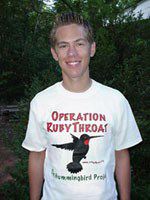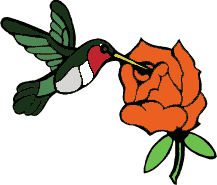|
|
|||
|
THIS WEEK at HILTON POND 22-31 July 2002 |
|
OPERATION RUBYTHROAT MEETS For most of the last week in July, we were far away from Hilton Pond Center, presenting at an international meeting of scientists, educators, and government officials in Chicago. As much as we'd rather not travel during prime hummingbird banding season--late July through early September--we felt obligated and honored to participate in the 7th Annual GLOBE Conference. We hope you'll bear with us as we explain why this gathering was an extremely important event in the history of Hilton Pond Center and "Operation RubyThroat: The Hummingbird Project." 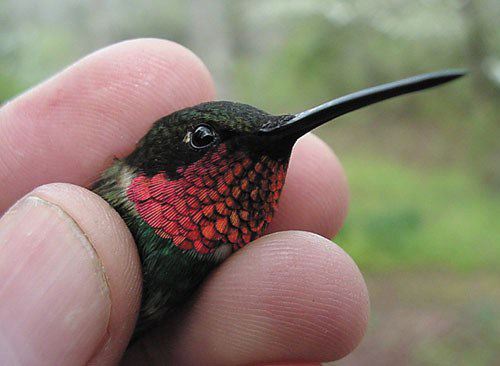 All text & photos © Hilton Pond Center GLOBE--a worldwide, Internet-based science education initiative for K-12 students--was created in the mid-1990's. It is a U.S. federal interagency program supported by NASA (National Aeronautics & Space Administration), NSF (National Science Foundation), EPA (Environmental Protection Agency), and the State Department, in partnership with colleges and universities, state and local school systems, and non-government organizations such as Hilton Pond Center. Internationally, GLOBE (logo below right) is a partnership between the United States and 97 other countries. GLOBE encourages students to engage in real-life, hands-on science learning by enabling them to:
Over the past seven years, 20,000 teachers worldwide have attended GLOBE workshops and 12,000 schools have had teachers trained through the program; as of this summer, their students had reported more than 8 million measurements--a huge data set by anyone's standards. And so, you might ask, what has GLOBE to do with Operation RubyThroat and why are we describing all this in an installment of "This Week at Hilton Pond"? In early March--just in time for the 2002 migration season--Operation RubyThroat affiliated with GLOBE and became the its first-ever protocol to involve animal observations. Through GLOBE's Web site, students at GLOBE-certified schools in the U.S., Canada, Mexico, and all seven countries of Central America can now observe Ruby-throated Hummingbirds (RTHUs) and submit data about hummingbird behavior and ecology. For U.S. and Canadian students, Operation RubyThroat protocols include observations about the first date RTHUs are seen locally in spring, each day they are observed during the breeding season, Another protocol involves watching schoolyard hummingbird feeders and/or a patch of hummingbird flowers and counting the number of RTHU visits in a 45-minute block--an exercise that we hope will give us an idea of population densities of ruby-throats in different communities in the ten participating countries. And, since RTHUs breed throughout the eastern U.S. and southern Canada, students there who are lucky enough to find nests (right) can make behavioral observations and perhaps help us understand, for example, whether double-brooding is dependent on latitude. One of the really neat things about GLOBE is that all these hummingbird data can be correlated against traditional GLOBE protocols such as minimum-maximum temperature, precipitation, and quality and type of land cover--plus newer GLOBE protocols that look at spring bud-burst and green-up. By aligning with GLOBE, Operation RubyThroat now has the potential to recruit thousands of K-12 students in ten Western Hemisphere countries--literally an "academic army" of hummingbird-watchers! Since GLOBE protocols are scientifically rigorous and all observations are subject to review by professional scientists, hummingbird data submitted by GLOBE students may indeed help us discover wonderful new things about RTHUs and their behavioral ecology.
And now for some equally great news: The National Science Foundation believes so strongly in the scientific and educational value of Operation RubyThroat that it has awarded Hilton Pond Center a 42-month grant of $180,000! These monies will help underwrite our efforts to train teachers and students to collect hummingbird data through GLOBE, analyze it, And some other good news: You--as a nature and/or hummingbird enthusiast--can assist in Hilton Pond Center's effort to help students learn what they need to know to understand hummingbird behavior and protect hummingbird habitat. Here's how:
We hope you share our excitement over the Center's NSF grant and our affiliation of "Operation RubyThroat: The Hummingbird Project" with The GLOBE Program. All this activity has slowed us down a bit on posting our usually timely installments of "This Week at Hilton Pond," but we're sure you understand and will stay tuned for next week's edition. In the meantime, Happy Hummingbird Watching!
If you enjoy "This Week at Hilton Pond," please help Support Hilton Pond Center for Piedmont Natural History. It's painless, and YOU can make a difference! You may wish to consult our Index of all nature topics covered since February 2000. For a free, non-fattening, on-line subscription to "This Week at Hilton Pond," just send an e-mail with "Subscribe" in the subject line to THIS WEEK |
||

 Take scientifically valid measurements about climate, atmosphere, water, soils, land cover, phenology, and other natural phenomena
Take scientifically valid measurements about climate, atmosphere, water, soils, land cover, phenology, and other natural phenomena
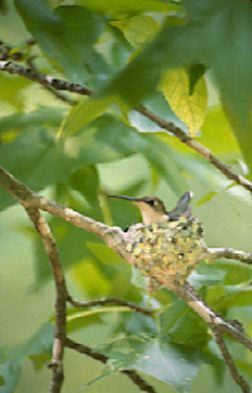 and the last date they are sighted in autumn; Mexican and Central American students collect similar data, except their arrival dates on the "wintering grounds" are in fall and departure dates are in spring.
and the last date they are sighted in autumn; Mexican and Central American students collect similar data, except their arrival dates on the "wintering grounds" are in fall and departure dates are in spring.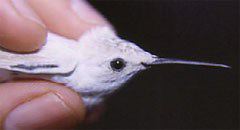 And, while all these student observers are maintaining classroom-window hummingbird feeders, installing Schoolyard Hummingbird Habitats, and monitoring RTHUs, their multi-national network also can be on the lookout for "unusual" hummingbirds, including those with odd plumages (such as a leucistic RTHUs, above left); vagrant hummingbirds (such as the many species of western and Mexican hummers that are being sighted in winter in the eastern U.S.,
And, while all these student observers are maintaining classroom-window hummingbird feeders, installing Schoolyard Hummingbird Habitats, and monitoring RTHUs, their multi-national network also can be on the lookout for "unusual" hummingbirds, including those with odd plumages (such as a leucistic RTHUs, above left); vagrant hummingbirds (such as the many species of western and Mexican hummers that are being sighted in winter in the eastern U.S., 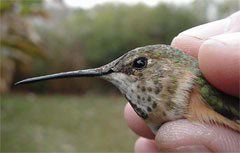 including an adult female Rufous Hummingbird banded "out-of-range" at Irmo SC in December 2001, right); and color-marked hummingbirds such as those that get necklaces of green dye at Hilton Pond Center (below left). Any time these "unusual" hummingbirds are reported through GLOBE and Operation RubyThroat, the Center will quickly alert other local experts--including those who are part of Bob Sargent's Hummer/Bird Study Group--
including an adult female Rufous Hummingbird banded "out-of-range" at Irmo SC in December 2001, right); and color-marked hummingbirds such as those that get necklaces of green dye at Hilton Pond Center (below left). Any time these "unusual" hummingbirds are reported through GLOBE and Operation RubyThroat, the Center will quickly alert other local experts--including those who are part of Bob Sargent's Hummer/Bird Study Group--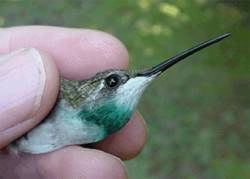 in the hope they will be able to verify and possibly band and release the hummingbirds in question. Although fewer than 100 people are authorized to band hummers, they are geographically spread and may be able to interact with a local school in the GLOBE/Operation RubyThroat network. Through this kind of activity, hummer banders can be important resources for local teachers while their own hummingbird investigations may be enhanced--thanks to the "eagle eyes" of students.
in the hope they will be able to verify and possibly band and release the hummingbirds in question. Although fewer than 100 people are authorized to band hummers, they are geographically spread and may be able to interact with a local school in the GLOBE/Operation RubyThroat network. Through this kind of activity, hummer banders can be important resources for local teachers while their own hummingbird investigations may be enhanced--thanks to the "eagle eyes" of students. and possibly publish their results on the Internet and in peer-reviewed science journals. The award from NSF is significant and meaningful and--coupled with recent and current grants from The Christensen Fund ($35,000), Foundation for the Carolinas ($6,000), National Fish & Wildlife Foundation ($17,500), Phillips Petroleum Migratory Bird Fund ($17,500), Perky-Pet Corporation ($2,000), and small businesses and individuals ($12,000 and counting!)--empowers the Center to move forward on broadening its educational and scientific impact on K-12 students through Operation RubyThroat and GLOBE.
and possibly publish their results on the Internet and in peer-reviewed science journals. The award from NSF is significant and meaningful and--coupled with recent and current grants from The Christensen Fund ($35,000), Foundation for the Carolinas ($6,000), National Fish & Wildlife Foundation ($17,500), Phillips Petroleum Migratory Bird Fund ($17,500), Perky-Pet Corporation ($2,000), and small businesses and individuals ($12,000 and counting!)--empowers the Center to move forward on broadening its educational and scientific impact on K-12 students through Operation RubyThroat and GLOBE.
